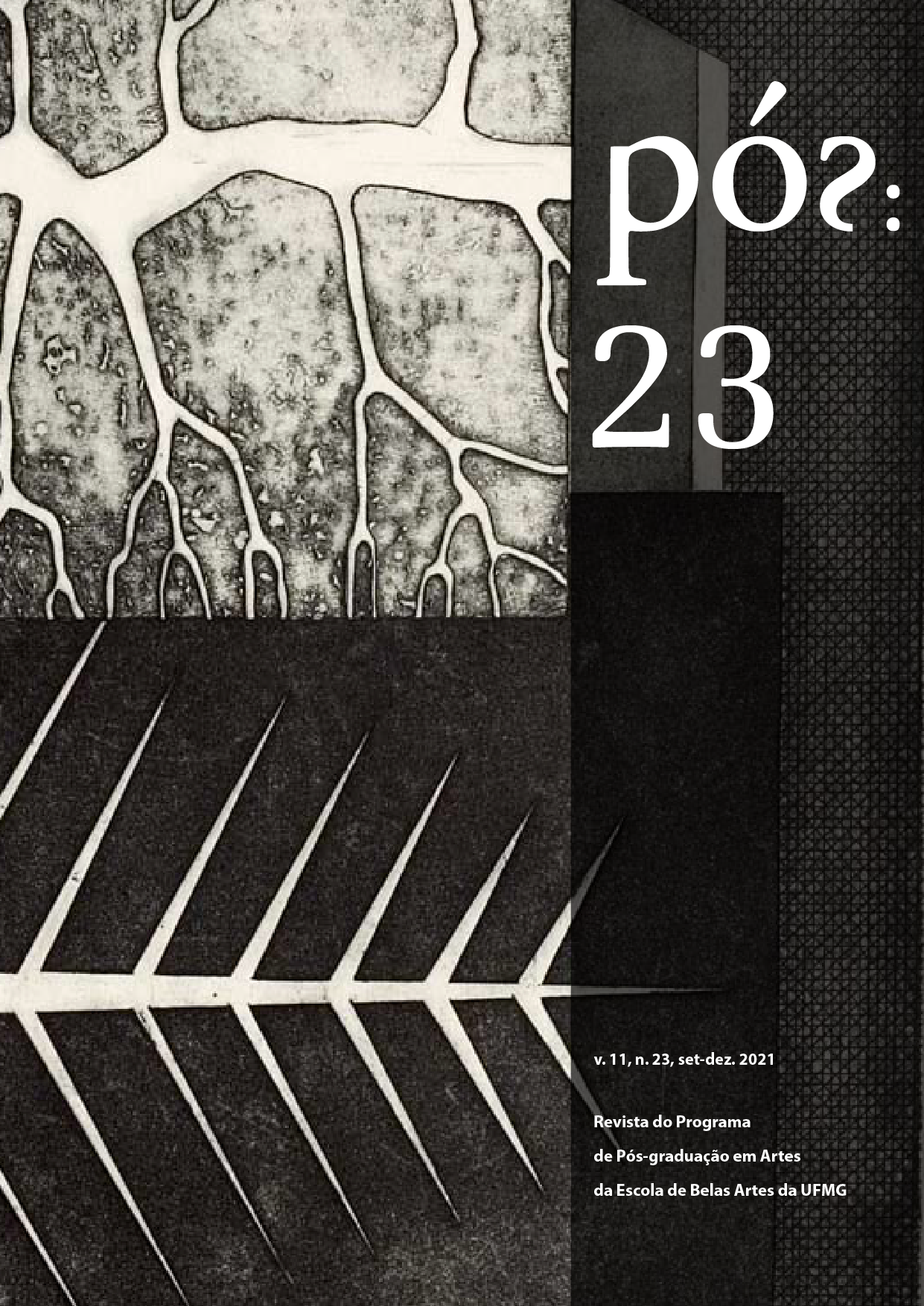O desenho precursor de uma performance negra no entreato do Teatro de Revistas branco (1920-1930)
DOI:
https://doi.org/10.35699/2237-5864.2021.29697Palabras clave:
Performance, Historicidade, Afro-brasileiras, ArtesResumen
O presente artigo versa sobre a construção da imagem da mulher afro-brasileira no Teatro de Revista, nas décadas de 1920 a 1930. A abordagem focaliza na impactante presença da mulher negra no palco, a partir de um breve estudo sobre a vida das primeiras estrelas negras do teatro revisteiro: Aracy Cortes, Ascendina dos Santos, Rosa Negra até finalizar com Déo Maia. A partir desta analise procura-se perceber o desenho deum imaginário negro que fortuitamente toma de assalto o palco, até então ornado como local de deleite da classe alta branca e de outras que queriam embranquecer-se.
Descargas
Referencias
ABREU, Martha. Sobre mulatas orgulhosas e crioulas atrevidos: conflitos raciais, gênero e nação nas canções populares (Sudeste do Brasil, 1890-1920). Tempo, Departamento de História da Universidade Federal Fluminense, v. 8, n. 16, p. 1-31, 2004.
ALMEIDA, Paulo Roberto de. A presença negra no teatro de revista nos anos 20. 2016. 216 f. Dissertação (Mestrado em História Social) – Programa de Pós-graduação em História, Universidade Federal Fluminense, Niterói, 2016.
BIBLIOTECA Nacional. Hemeroteca Digital Brasileira. Disponível em: <http://bndigital.bn.gov.br/hemeroteca-digital/>. Acesso em: 3 fev. 2021.
BRITO, Deise Santos de. Um ator de fronteira: Uma análise da trajetória de grande Otelo no teatro de revista brasileiro entre as décadas de 20 e 40. 2011. 163 f. Dissertação (Mestrado em Artes Cênicas) – Programa de Pós-graduação em Artes Cênicas, Universidade de São Paulo, São Paulo, 2011.
CABRAL, Sergio. Grande Otelo, uma biografia. São Paulo: Editora 34, 2008.
CHIARADIA, Filomena. Iconografia teatral. Acervos fotográficos de Walter Pinto e Eugênio Salvador. Rio de Janeiro: Funarte, 2011.
LIGIÉRO, Zeca. Carmem Miranda uma performance afro-brasileira. Rio de Janeiro: Publit, 2006.
LIGIÉRO, Zeca. Corpo a Corpo: estudo das performances brasileiras. Rio de Janeiro: Garamond, 2011.
LOPES, Antônio Herculano. Algumas notas sobre o mulato, a mulata e a invenção de um país sem culpa. Rio de Janeiro: Casa Rui Barbosa, 2001.
LOPES, Antônio Herculano. Vem cá, Mulata!Tempo, Departamento de História da Universidade Federal Fluminense (UFF), v. 21, p. 80-100, 2008.
MARTINS, Leda Maria. A cena em sombras. São Paulo: Perspectiva, 1995.
MENCARELLI, Fernando Antônio. Cena aberta: a absolvição de um bilontra e o teatro de revista de Arthur Azevedo. Campinas: Editora da Unicamp, 1999.
PAIVA, Salvyano de. Viva o Rebolado! Vida e morte do teatro de revista brasileiro. Rio deJaneiro: Nova Fronteira, 1991.
RUIZ, Roberto. Araci Cortes: Linda Flor. Rio de Janeiro: Funarte, Divisão da Música Popular, 1984.
SAROLDI, Luiz Carlos; MOREIRA, Sonia Virginia. Rádio Nacional o Brasil em sintonia. Rio de Janeiro: Zahar, 2006.
VENEZIANO, Neyde. O teatro de revistas no Brasil: dramaturgia e convenções. Campinas: Pontes. Unicamp, 1991.
VIANNA, Hermano. O mistério do Samba. Rio de Janeiro: Zahar, 1995.
Descargas
Publicado
Número
Sección
Licencia
Derechos de autor 2021 Lea Maria S. Leal

Esta obra está bajo una licencia internacional Creative Commons Atribución-NoComercial 4.0.
Los autores que publican en esta revista aceptan los siguientes términos:
- Los autores conservan los derechos de autor y conceden a la revista el derecho de primera publicación, con el trabajo bajo la Licencia Creative Commons Attribution-NonCommercial 4.0 International License que permite compartir el trabajo con reconocimiento de autoría y publicación inicial en esta revista;
- Los autores pueden celebrar contratos adicionales por separado, para la distribución no exclusiva de la versión del trabajo publicado en esta revista (por ejemplo, publicar en un repositorio institucional o como capítulo de un libro), con reconocimiento de autoría y publicación inicial en esta revista.
- Se permite y anima a los autores a publicar y distribuir su trabajo en línea (por ejemplo, en repositorios institucionales o en su página personal) en cualquier momento antes o durante el proceso editorial, ya que esto puede generar cambios productivos, así como aumentar el impacto y la cita del trabajo publicado.
- Es responsabilidad de los autores obtener permiso escrito para utilizar en sus artículos materiales protegidos por la ley de derechos de autor. La Revista PÓS no se hace responsable de las violaciones de los derechos de autor de sus colaboradores.












